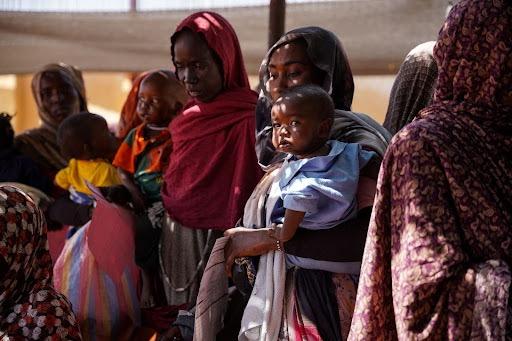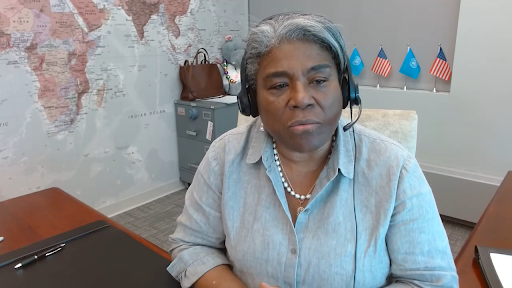The News
Sudan’s war between the Sudanese army and the Rapid Support Forces paramilitary group has spawned one of the world’s largest humanitarian crises.
The conflict, which broke out in April last year, has forced around 9 million people to flee their homes and left the country on the brink of famine amid a warning by the United Nations that acts of genocide may be unfolding in the country.

But some fear that the conflicts in Gaza and Ukraine have diverted the world’s attention away from the situation in the Horn of Africa country. US Ambassador to the United Nations Linda Thomas-Greenfield, a veteran US-Africa diplomat, told Semafor Media’s Mixed Signals podcast that the media is ignoring the crisis in Sudan. Here’s a partial transcript from her conversation with hosts Ben Smith and Nayeema Raza.
Know More
Nayeema: When we saw you just a couple of days ago, you launched into a kind of media criticism. You were talking about the media’s failure to cover Sudan, something that you’ve been vociferous about. So, explain your criticism here.
Amb. Thomas-Greenfield: When you look at the numbers in Sudan, 25 million people in need of international humanitarian assistance. And that’s more than the population of the United States’ 10 largest cities. I mean, this is a huge, huge crisis, and it’s affecting millions of people. There’s a war raging now in which there are predictions and reports, that genocide is happening. And yet this does not get the front-page attention of the international press. So that’s where my criticism is.

Ben: But I think a cynical editor, not that I am one, would push back and say, “Hey, look, don’t blame us, blame our audience, they’re not reading these stories. They’re interested in Gaza, they’re not interested in Sudan. Sorry.” What do you say to that?
Amb. Thomas-Greenfield: What I say is, that the press has influence on what the audience reads. Of course, if you’re reporting front page every single day, a single issue, that’s what people are going to be looking for. But you can report on these other issues. You can help them determine what they should be reading.
And I think that’s something that the press has the power to do. And I think what is reflected is your own priorities. You think this is what people want to hear, they want to hear Gaza, it has more political interest. And I’m not saying Gaza is not important. It is very important.
Ben: One argument that you hear people make, and I just want to sort of be very careful here... is that the reason that people pay attention to Gaza over Sudan, is connected to a kind of anti-Semitism essentially? Is that what you see? I mean, do you think that, that’s why Gaza is being elevated?
Amb. Thomas-Greenfield: No, I don’t think that. I don’t think it’s related to the issue of anti-Semitism, which is an issue. And it is something that is definitely important for you to cover. But I think what is happening in Gaza is, it’s about a conflict that is taking place in the Middle East, and there tends to be a lot of attention paid to that.
Nayeema: And I think also because it is an international conflict that has of course US military aid being provided to Israel. Which of course, invites a greater coverage concern, accountability that’s being sought. But you’re not constructing a zero-sum argument here, I don’t think-
Amb. Thomas-Greenfield: No, I am not. It is not a zero-sum game. This is about saving lives wherever they are being lost. It’s about valuing life, wherever people are suffering. And the people of Sudan are suffering right now, and they are not getting the attention from the press, or from the world about what is happening there.
Two generals with political ambitions, fighting over political spoils, and not caring about the welfare of their own people. That’s what we see happening in Sudan. And it is for that reason that we have to care about what is happening there, focus attention on what’s happening there, and report on what’s happening there.
Ben: To bring it back to where we started. Do you think people die in Sudan, because the media doesn’t cover it? I mean, are there real stakes here, or is it just whether people are informed?
Amb. Thomas-Greenfield: I think people are forgotten, and when they are forgotten, more people die, because we’re not paying attention to what is happening to them. And when they’re forgotten, they lose hope. And so if the people of Sudan know, at least the world is aware of what is happening to them, it gives them a better sense of hope. And it forces all of us to pay attention to what is happening. So maybe fewer people do die.
Nayeema: Right. Oh, people can also die when there is continuing coverage as well, as we’ve obviously seen. And I do want to point out, the New York Times had a great A1 story-
Amb. Thomas-Greenfield: They did.
Nayeema: ... by Declan Walsh and Ivor Prickett, just days ago.
Amb. Thomas-Greenfield: I take some credit for that.
Nayeema: Oh, do you?
Amb. Thomas-Greenfield: I do. And it’s because I have been pushing this issue. I will have a press interview on Sudan, and the first question I get, is on Gaza? And I said, “But this is about Sudan.” And the op-ed that I did in the New York Times, I think, made a difference.
Nayeema: Ambassador, we know you have a vote to get to, so we don’t want to keep you much longer, but thank you for being with us today to talk about Sudan, and to talk about Gaza.
Amb. Thomas-Greenfield: Well, thank you for paying attention to Sudan. And again, anywhere there’s suffering in the world, we have to pay attention. There’s no competition for crisis reporting, but there is sometimes a neglect of crisis in places in the world. And that particularly happens on the continent of Africa. And I’ll leave you with... Take a look at what is happening in DRC as well.
